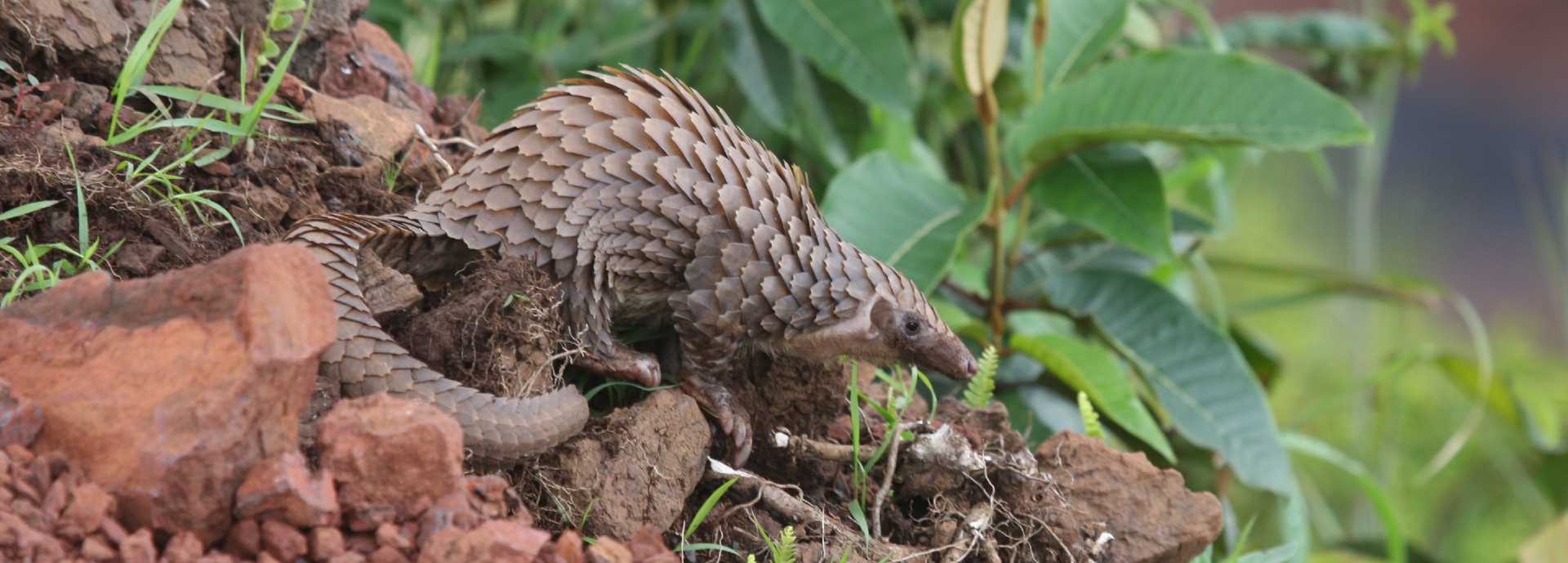University of Stirling scientists have laid the groundwork for new research which has created a source-to-destination map of the most trafficked mammal in the world — the pangolin.
A team led by Professor Kate Abernethy has been sampling genetic material of wild pangolins in Gabon since 2014 and this has now enabled the tracing of trafficked pangolins.
Disrupting the illegal pangolin trade has proved challenging. There are eight different species, found in 23 countries, and they have a collective range of 2.3 million square mile.
Pangolin poachers in Africa can sell a single animal for £200 — nearly a year’s salary in many poaching regions — but most of the profit goes to trafficking organisations.

Faculty of Natural Sciences
Researchers have sampled wild pangolins...to provide the genetic material that now enables tracing of pangolins.
Pangolin scales are transported around the world for sale as traditional medicine. The white-bellied African species is typically shipped to China and other Asian countries.
Now, researchers have developed a powerful new approach that uses genomics to identify poaching and trafficking hotspots.
Using these findings and research methods outlined in a study published in the journal Science, law enforcement agencies can now trace white-bellied pangolin products from the international supply chain to the places in West and Central Africa where the animals were poached.
This creates new opportunities to disrupt the international wildlife trade and guide anti-trafficking measures, researchers said.
Professor Kate Abernethy of the University of Stirling’s Faculty of Natural Sciences, a co-author of the paper, said: “University of Stirling has been collaborating with the Gabonese government since 1980 to support national scientists and co-produce policy-relevant research.
“This new research actually began a decade ago, to address the emerging threat posed by international trafficking of African pangolins, as Asian species declined in the wild.
“In collaboration with the University of Masuku, the National Parks Agency and the Institute for Research in Tropical Ecology, students and researchers have sampled wild pangolins across the country since 2014, to provide the genetic material that now enables tracing of pangolins trafficked from the country.
“This research will significantly strengthen Gabon’s ability to conserve its native species and manage them proactively in the face of illegal harvesting for exterior trade.”
Genome mapping
To track the pangolin trade from market to habitat, the study authors from UCLA mapped the white-bellied pangolin’s genome and collected 111 samples from this species from known localities across Central Africa to genetically map distinct geographic populations.
The researchers then took genetic material from pangolin scales — sampled from roughly one million individual animals — seized from transit in Hong Kong.
Matching the two sources, they were able to determine where the most intense poaching is taking place and create a map that follows the trade routes.
Senior study author Thomas Smith, an evolutionary biologist and founding director of UCLA’s Centre for Tropical Research, said: “The genetic screening takes a few days and is accurate at locating an animal’s origin to within about 125 miles.
“Someone could unload a sack of scales from a ship in Hong Kong, and you could take a single scale and determine, for instance, that it came from an animal near the city of Bata in Equatorial Guinea.”
Researchers found that most scales are first shipped to Nigeria, the major regional hub for distribution. From there, they are transported to markets in countries including China, Thailand, Vietnam, Laos and Singapore.
All eight pangolin species, four in Africa and four in Asia, are endangered, and the demand for their scales, meat and other parts has pushed three Asian species — the Sunda, Philippine and Chinese pangolins — to the brink of extinction.
Critically endangered
The International Union for Conservation of Nature lists them as critically endangered. Once these Asian species became scarce, traffickers turned their attention to Africa and the white-bellied pangolin.
UCLA’s Jen Tinsman, the paper’s lead author and a researcher at Centre for Tropical Research, said: “We don't know how many white-bellied pangolins are left because they're really hard to study in the wild. But we know this level of harvest is unsustainable, no matter the actual population size.”
She added: “If we can get our tracking methods into the hands of enforcement officers in those countries where pangolins are most threatened, it would allow near real-time monitoring of illegal trade and help shut it down.”
The paper Genomic analyses reveal poaching hotspots and illegal trade in pangolins from Africa to Asia is published in Science.

